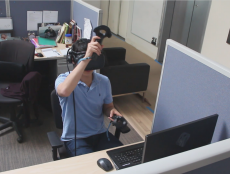
Articles
Editor’s Picks
K-12
A Union Drive, Series of Departures, and Contested Hire at The Florida Virtual School
By Cait Etherington
September 11, 2018
While the new school year may be underway, at the Florida Virtual School (FLVS), it is not business as usual. Recently, the school has faced a series of formal complaints by staff, undergone several administrative upheavals, and hired an outside law firm and PR firm to help manage the crisis. Notably, unlike many other troubled online K-12 schools, the FLVS is a public, not private school. It was the first statewide public virtual school and prior to the current upheavals, it has often been held up as a model for K-12 online education.
In mid-August, the Orlando Sentinel reported that following several complaints from employees, the Florida Virtual School contracted with an outside law firm to investigate the situation and accepted the resignation of its general counsel, Frank Kruppenbacher. Earlier this week, eLearning Inside News ran a story on Kruppenbacher’s departure and other recent events at the FLVS. Immediately after the story ran, several people connected to the FLVS contacted eLearning Inside News to share additional information. This is what we learned in our subsequent investigation.
The Departure of the General Counsel, CEO, and Chief Academic Officer at Florida Virtual
First, while the Orlando Sentinel was correct to point out that Frank Kruppenbacher has resigned, over the summer, the school also saw several other high-profile departures. According to Megan Paquin, a representative from &Barr, a public relations firm that the Florida Virtual School has contracted to manage their current situation, Dr. Jodi Marshall resigned as the FLVS CEO on June 15 to pursue “other opportunities” but agreed to continue serving the FLVS in an advisory role for 180 days to ensure “a smooth transition.” In addition, the FLVS Board of Trustees recently made a decision to not renew the annual contracts of Clark Berry, chief academic officer, and Dr. Polly Haldeman, chief customer officer. But Kruppenbacher, Marshall, Berry, and Haldeman have not been the only recent departures.
Decision to Not Renew Some Out-of-State Contracts
Our investigation found that the “multiple employee complaints” referred to in the letter issued by FordHarrison on August 9 to the chairman of the school’s board of trustees include complaints contesting the termination of 33 contracts. In Spring 2018, 33 of the FLVS’s 80 out-of-state teachers and staff were let go. Although many of the teachers and support staff had been working out-of-state for part or the entirety of their contracts with the Florida Virtual School and never before been told that their out-of-state status was an issue, last spring, they were given less than 90 days to return to Florida and told that if they did not return to the state, their contracts would not be renewed.
Last May, Kruppenbacher, who was still working for the school at the time, told News6 in Orlando that the selections were based on how “critical” the out-of-state jobs were to the overall school system: “Our goal is to make sure we are investing back in the state. This isn’t a reflection on them (the teachers), it’s a reflection on the fact that their jobs can be done back in Florida.” Given that only 33 of 80 out-of-state teachers and support staff were told to return to Florida or face non-renewal, however, there is some speculation that the decision may not be solely related to the school’s reassessment of staffing needs.
As part of our investigation, we talked to one former out-of-state employee who was among the 33 teachers and staff who did not have their contract renewed. The teacher, who had worked for the Florida Virtual School for several years prior to receiving news that their contract would not be renewed, suspects that the terminations were not entirely based on the school’s shifting needs or budgetary constraints. The employee, who asked to remain anonymous due to their ongoing legal case with the Florida Virtual, told eLearning Inside News, “Some of my former colleagues believe that Lauren Masino was the target and everyone else was collateral damage.” Notably, Lauren Masino recently attempted but fell short of establishing a union at the FLVS. However, our own investigation found that not all the out-of-state employees whose contracts were not renewed by the FLVS supported the union.
The Data Breach and Contested Hire
While most of the current news at the Florida Virtual School appears to be about the school’s recent departures among administrators, support staff, and teachers—either due to resignations or the failure to renew contracts—the school is also now grappling with a contested hire.
As reported in Education Week earlier this year, the FLVS has recently suffered a series of data breaches. In one case, the personal information of more than 368,000 students who have taken courses at the FLVS was left unsecured for nearly two years, exposing them to potential identity theft. To the FLVS’s credit, efforts have been made to remedy the problem. This included hiring a new Chief Technology Innovation Officer (CTIO), but this hire appears to now be at dispute as well.
In June, following news about the data breach, the Florida Virtual School posted a position for a CTIO. The job call, which allegedly only appeared on the FLVS and not on external job sites and was posted for just one day before the hire, called for a highly qualified CTIO—someone with a master’s degree in information technology or educational technology and “Ten years’ high-level experience in Information Technology or Educational Technology.”
In the end, the FLVS hired Donald Davis. Mr. Davis does not have a master’s degree nor even a bachelor’s degree. In fact, Mr. Davis graduated from Sebastian River High School in 2000 and has no other formal training in the field. Since then, he has held a series of progressively responsible jobs in the technology field, most recently as the Chief Technology Officer at the Florida Department of Corrections. Still, some people are wondering, why he was hired at all and whether his hire is consistent with a wider pattern of potentially nepotistic hiring at the school.
When eLearning Inside News reached out for a statement, the representative from &Barr would only say, “As is the case for all candidates, Mr. Davis was offered a contract for employment upon the successful completion of a standardized and thorough screening process.” When explicitly asked to confirm whether the job posting was posted on any job sites beyond the Florida Virtual site and posted for more than one day, we received an equally vague response. The representative at &Barr would only confirm again that the CIO position (notably, the job title changed from CTIO to CIO during the hiring process) was an appointment by the FLVS Board of Trustees and that Mr. Davis was appointed to the role “after a thorough screening process.”
What’s Next for Florida Virtual?
Over the past two decades, the Florida Virtual School has taught well over 300,000 students (in Florida all students must complete at least one online course and many complete this requirement at the FLVS). The school has also demonstrated an ability to scale its educational offerings, even during crises (e.g., in fall 2017, the school accommodated hundreds of Puerto Rican students displaced from their homes and schools after Hurricane Maria). Given the school’s history, it seems likely that the FLVS will persist, but at this time, there is no question that it is facing an internal crisis of management and culture.









No Comments